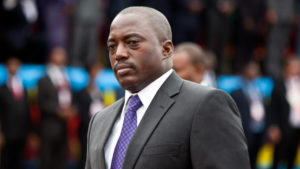
Joseph Kabila (Photo from The Guardian)
Current Political Crisis
The Democratic Republic of Congo has been plagued with political instability ever since independence from Belgium in 1960. This instability has contributed greatly to widespread government corruption, due to limited mechanisms of accountability. In 2006, the first democratic elections were held in over four decades and Joseph Kabila, the son of former President Laurent-Désiré Kabila, was elected. After his five-year term had expired, he was reelected in 2011. Though there were widespread allegations of voter fraud, Joseph Kabila served a second term that officially ended in 2016. Congo’s constitution allows a president to serve for only two terms, which Kabila had completed. However, rather than organizing a free and fair election and preparing for a new administration, the Kabila administration postponed elections. The administration began to suppress political opposition groups and arrest prominent civil society leaders. This marked a clear shift to a new political landscape – reminiscent of a dictatorial regime. Kabila has maintained a stronghold on power, reaping the monetary benefits of Congo’s resources, while widespread poverty among the general population continues, promulgating food insecurity and high infant mortality.
Responses
Kabila’s abuse of power and disregard for the constitution has sparked large-scale protests, many of which have been spearheaded by youth activists. Thousands of Congolese citizens have been, and continue to be, active in protests in Goma, Kinshasa, Mbandaka and other cities in Congo. Youth activists have been instrumental in mobilizing civil society throughout the country. Groups like Lucha and Quatrieme Voix have both generated and sustained international attention regarding the human rights abuses being committed by the Kabila administration. Both Lucha and Quatrieme Voix are groups that have committed themselves to pro-democracy efforts and ensuring that youth are integral to the political dialogues that transpire in Congo. The Kabila administration has targeted high-profile leaders of these groups, allegedly detaining and torturing them.
Unfortunately, Kabila has been adamant to dismantle these protests using any means necessary. Security forces deployed by him have beaten, arrested, an even killed peaceful protestors. In 2017 alone, upwards of “300 opposition leaders and supporters, journalists, and human rights and pro-democracy activists were arrested and jailed”. Pressure from Western countries have prompted the release of some of the arrested individuals, but many are apparently still being held against their will. The exact number of people who have been detained since December 2016 is undetermined but has been estimated to be as high as 600. Over the past three years, Congolese security forces have killed over 300 people engaging in political protests. However, this has not deterred civil society from continuing to push for elections and accountability. The Catholic Church has also become involved in mobilizing the population, organizing protests in conjunction with the Lay Coordination Committee, a spiritual group. In response, security forces have attacked churches with tear gas and ammunition while civilians attended Mass.
The Kabila administration had originally stated that elections would be held at the end of 2017. This did not occur, however, and the administration blamed the delay on financial and logistical obstacles. Now, elections have been set for December 23, 2018, but it is unclear if Kabila will actually follow through with this plan. There is also speculation that he may add himself to the ballot, which would violate the constitution. With the upcoming elections quickly approaching, tensions continue to rise.
The political crisis in Congo has sparked multifaceted international responses. On March 27, 2018, the UN Security Council unanimously passed resolution 2409 extending MONUSCO’s mandate, the largest peacekeeping mission in the world involving approximately 20,600 personnel, with the aim of protecting civilians from violence arising from political turmoil. Furthermore, the United States has publically articulated its support for free and fair elections. On June 21, the US Department of State imposed visa bans and sanctions on high-level Congolese officials with prior ties to electoral corruption and fraud.
Promising Future
With half of the country’s population under the age of 24, there is a new generation of youth that are pushing for change in Congo. While the world often focuses on the wide-scale violence and human rights abuses occurring in the Democratic Republic of Congo, the heroism and resilience exhibited by everyday citizens is often overlooked. It is this heroism that almost inevitably will change the trajectory of the Democratic Republic of Congo. Youth activists in Congo should be supported in whatever ways possible so they can continue striving for transparency, accountability and self-determinism.